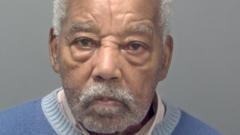Why Did I Have to Investigate My Own Abuse Case After Police Failed Me?

The Silent Struggle Against Coercive Control: Understanding the Impact and Seeking Justice
Caroline's story is one that resonates with many victims of coercive and controlling behavior (CCB). Ten years after CCB was made a crime in England and Wales, the struggle for recognition and justice persists. This article delves into the complexities of CCB, the obstacles victims face in seeking help from law enforcement, and the urgent need for improved police training and response strategies. Through the lens of Caroline’s experience and those like her, we aim to shed light on the often-hidden nature of coercive control and the systemic failures that leave victims feeling unheard and unsupported.
Understanding Coercive Control: A Definition
Coercive control is a form of domestic abuse that goes beyond physical violence. It includes a range of behaviors aimed at dominating and controlling a partner's life. This can manifest in various ways, such as:
- Monitoring a partner's whereabouts
- Controlling finances
- Dictating what they wear or eat
- Isolation from friends and family
- Emotional abuse, including belittling and constant criticism
These behaviors create an environment of fear and dependency, making it incredibly difficult for victims to escape their circumstances. The psychological effects can be profound, leading to long-term trauma and mental health issues.
The Alarmingly Varied Response by Police Forces
Despite the legal recognition of coercive control, a staggering disparity exists in how police forces across England and Wales respond to incidents. Reports indicate that some police areas record coercive control crimes at rates three times higher than others. This inconsistency reflects a lack of understanding and training about what coercive control entails. Victims like Caroline often find themselves in a position where they must act as their own advocates, a situation that is not only unjust but incredibly taxing both emotionally and psychologically.
The Personal Toll of Seeking Justice
For many victims, the journey to justice is fraught with challenges. Caroline's experience illustrates this struggle vividly. Despite meticulously documenting her experiences with her ex-partner, Clive Thomas, she faced numerous obstacles:
- Delayed appointments with law enforcement
- Misplaced evidence
- Inaccuracies in her statements
After an agonizing six-year fight, she found herself having to hire a lawyer and appeal the Crown Prosecution Service's decision to not bring charges, highlighting the systemic failures in the handling of CCB cases.
Why Coercive Control Cases Are Challenging to Prosecute
The nature of coercive control makes it particularly challenging to prosecute. Unlike physical violence, which often leaves visible marks, coercive control can be subtle and insidious. This can result in law enforcement officials underestimating the severity of the situation. Factors contributing to the challenges include:
- Lack of physical evidence
- Difficulty in gathering testimonies from witnesses
- Misunderstanding of the psychological dynamics at play
Victims may also feel discouraged from coming forward due to a fear of not being believed or taken seriously. This is exacerbated by a lack of awareness and training among police officers, which further complicates the reporting process.
Personal Accounts: Caroline and Gemma
Caroline's story is not isolated. Many victims, including a woman known as Gemma, share similar experiences. Gemma meticulously chronicled her abusive relationship, gathering over 100 pieces of evidence, including photographs and witness statements. However, she too faced a dismissive attitude from law enforcement, where officers expressed skepticism about the ability to prove her case. This left her feeling gaslit and unsupported.
Systemic Failures in Addressing Coercive Control
According to experts, the disparities in police responses and the high rates of unreported cases suggest a systemic failure in addressing coercive control. The National Police Chiefs' Council (NPCC) acknowledges the need for improvement and has introduced various initiatives, such as the Domestic Abuse Risk Assessment (Dara). However, reports indicate that many police forces are still not utilizing these updated processes, leaving victims vulnerable and underserved.
Call for Change and Accountability
Lawmakers and advocates are calling for a radical shift in how police forces approach coercive control. Sir Robert Buckland, the former Attorney General, emphasizes that crime should not vary based on geographic location, stating that victims should not have to take on the role of detectives in their own cases. Jess Phillips, the Minister for Safeguarding and Violence against Women and Girls, has echoed similar sentiments, highlighting the devastating impact of coercive behavior and the urgent need for law enforcement to uphold the highest standards in their response to victims.
Support for Victims of Coercive Control
The psychological toll of coercive control can be overwhelming, often leading to conditions such as PTSD, anxiety, and depression. Victims often find themselves isolated, making it crucial for them to seek support. Various resources can assist victims in navigating their experiences:
- Domestic violence shelters
- Counseling services
- Legal aid organizations
- Support hotlines
These resources can provide essential support and guidance, helping victims to reclaim their lives and seek justice.
The Road Ahead: Educating and Empowering Police Forces
Improving police responses to coercive control requires comprehensive training and education. The Domestic Abuse Matters course aims to equip officers with the necessary understanding to deal with these complex cases. However, the variable uptake of this training across police forces indicates a significant gap that needs to be addressed.
To create a more informed and compassionate policing environment, continuous education on the dynamics of coercive control, trauma-informed responses, and the importance of believing victims is essential. As police departments commit to these changes, the hope is that victims like Caroline and Gemma will feel heard, validated, and supported in their pursuit of justice.
Conclusion
The stories of victims like Caroline and Gemma highlight the pressing need for systemic change in the handling of coercive control cases. It is imperative that law enforcement agencies recognize the seriousness of these offenses and respond with the urgency and sensitivity they deserve. As society becomes more aware of the nuances of coercive control, the path to justice can become less arduous for those who have suffered in silence. Together, we must advocate for change that prioritizes the safety and well-being of victims.
FAQs
What is coercive control?
Coercive control is a form of domestic abuse that involves controlling behaviors aimed at dominating a partner's life, often leading to psychological harm.
How can I report coercive control?
Victims can report coercive control to law enforcement, providing any evidence they have collected, such as text messages, photographs, or witness statements.
What support is available for victims of coercive control?
Victims can seek support from domestic violence shelters, counseling services, legal aid organizations, and various hotlines dedicated to helping those affected by abuse.
The journey toward recognition, support, and justice for victims of coercive control is ongoing. It requires a collective effort from society to ensure that no one feels alone in their struggle. How can we further advocate for those whose voices remain unheard? #CoerciveControl #DomesticAbuse #JusticeForVictims
Published: 2025-06-30 16:04:06 | Category: technology



